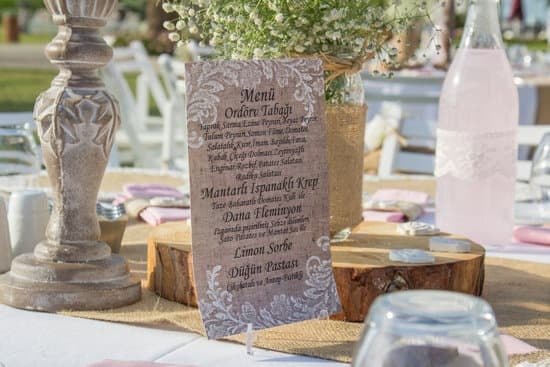Destination weddings have become increasingly popular among couples looking to add a unique and unforgettable touch to their special day. From picturesque beach settings to charming European destinations, getting married in a far-off location can create lasting memories for both the couple and their guests. In this article, we will explore how to plan a destination wedding, from selecting the perfect location to navigating the legal requirements and logistics of organizing a wedding away from home.
When it comes to planning a destination wedding, one of the first steps is choosing the ideal location that fits your vision for the big day. Factors such as accessibility, seasonality, and local attractions should be taken into consideration when deciding on a destination that will not only suit your preferences but also cater to the needs of your guests. Selecting a location that offers both natural beauty and cultural charm can set the stage for an unforgettable celebration.
In addition to finding the perfect destination, setting a budget is essential in ensuring that your dream wedding is financially feasible. Planning ahead and sticking to a budget can help you avoid any unexpected costs while still allowing you to create the wedding of your dreams. By carefully considering all aspects of planning, from accommodations and vendors to travel arrangements, you can successfully organize a destination wedding that reflects your love story in a magical setting.
Selecting the Perfect Destination
Destination weddings offer a unique and memorable experience for couples looking to tie the knot in a beautiful and exotic location. However, selecting the perfect destination for your wedding requires careful consideration of various factors to ensure everything goes smoothly on your big day. From choosing a place that resonates with you as a couple to considering travel logistics for your guests, here are some key factors to keep in mind when selecting the ideal destination for your wedding.
Personal Preferences
When deciding on a destination for your wedding, it’s important to consider both you and your partner’s personal preferences. Do you have a special connection to a particular place or culture? Are you looking for a beach ceremony or a mountain backdrop? Discussing your vision for the day can help narrow down potential locations that align with your style and interests.
Accessibility
Another crucial factor to consider when choosing a destination is accessibility. Think about how easy it will be for you and your guests to travel to the location. Is there an airport nearby? Are there direct flights available? Making sure that the destination is convenient and feasible for both you and your loved ones can help ensure that everyone can attend and enjoy the celebration without too much hassle.
Local Wedding Regulations
Before finalizing your decision on a destination, make sure to research the local wedding regulations and requirements at the chosen location. Different countries have varying rules when it comes to getting married, from residency requirements to documentation needed. Understanding these legalities beforehand can save you from any unexpected hurdles or delays as you plan your dream destination wedding.
Setting a Budget
Destination weddings can be a dream come true for many couples, offering a unique and romantic way to tie the knot in a beautiful location. However, planning a destination wedding can also come with its own set of challenges, especially when it comes to setting and sticking to a budget. With careful planning and strategic decision-making, you can still have the destination wedding of your dreams without breaking the bank.
Determine Your Priorities
Before you begin planning your destination wedding, sit down with your partner and discuss what aspects of the wedding are most important to you both. Whether it’s the venue, photography, or entertainment, knowing your priorities will help you allocate your budget accordingly. By focusing on what truly matters to you as a couple, you can avoid overspending on less essential elements of the wedding.
Research Destination Wedding Packages
Many resorts and venues that cater to destination weddings offer all-inclusive packages that can help streamline your planning process and save you money. These packages often include everything from accommodations to catering to decor, allowing you to have a beautiful wedding without having to source each vendor individually. Be sure to compare different packages and read reviews from other couples who have used them to ensure they meet your needs and expectations.
Keep an Eye on Exchange Rates and Hidden Costs
When planning a destination wedding in another country, it’s important to consider exchange rates and potential hidden costs that may arise. Fluctuations in currency values can impact your budget significantly, so be sure to factor this into your calculations and consider opening a separate account for foreign transactions. Additionally, be prepared for unexpected expenses such as permits or taxes specific to your chosen destination by padding your budget with a contingency fund.
By following these tips and staying organized throughout the planning process, you can set a realistic budget for your destination wedding and stick to it effectively. Remember that the most important thing is celebrating your love with family and friends in a stunning setting – by making smart financial decisions along the way, you can make sure your special day is everything you’ve ever dreamed of without breaking the bank.
Choosing the Right Vendors
Destination weddings are a dream come true for many couples looking to tie the knot in a unique and picturesque setting. However, one of the challenges that come with planning a destination wedding is finding reliable vendors in a location that might be unfamiliar to you. To ensure your special day goes off without a hitch, it’s essential to do thorough research and carefully select vendors who can bring your vision to life.
When it comes to choosing the right vendors for your destination wedding, start by asking for recommendations from your wedding planner or the venue coordinator. They often have a list of trusted vendors they have worked with in the past and can help you find professionals who are experienced in handling events at your chosen location.
Make sure to read reviews, browse through portfolios, and schedule video calls with potential vendors to get a sense of their work and communication style.
Additionally, consider hiring local vendors at your destination as they will have a better understanding of the area, culture, and logistics involved. Local vendors are also likely to have established relationships with other businesses in the area, which can streamline the planning process. Whether you’re looking for a florist, photographer, caterer, or any other vendor, communicate your expectations clearly and discuss any specific requirements or restrictions that may apply to your destination wedding.
| Tip | Detail |
|---|---|
| Ask for Recommendations | Wedding planner or venue coordinator can provide trusted vendor list |
| Hire Local Vendors | Better understanding of area and established relationships with other businesses |
Legal Requirements
Destination weddings are a dream come true for many couples, but before you can say “I do” in a foreign location, it’s essential to understand the paperwork and legalities involved. One of the first steps in planning a destination wedding is researching the legal requirements of the country where you plan to tie the knot.
Each country has its own set of rules and regulations regarding marriage, including residency requirements, necessary documentation, and waiting periods. It is imperative to familiarize yourself with these details to ensure that your marriage will be legally recognized.
When considering how to plan a destination wedding from a legal standpoint, hiring a local wedding planner or coordinator can be incredibly helpful. They will have the knowledge and experience needed to navigate the legal requirements of your chosen destination and can assist you in obtaining all the necessary paperwork.
Additionally, consulting with the embassy or consulate of the country where you plan to get married is advisable. They can provide you with up-to-date information on marriage laws, visa requirements, and any other legal considerations you need to address.
Another crucial aspect of understanding the legalities of getting married abroad is knowing whether your marriage will be legally recognized in your home country. Some countries require additional steps like obtaining an apostille or having your marriage certificate translated into your native language for it to be valid back home. It’s essential to research these requirements well in advance so that there are no surprises after your destination wedding is over.
| Destination Wedding Legal Requirements | Key Considerations |
|---|---|
| Research the specific legal requirements of your chosen destination | Each country has its own rules for marriages |
| Hire a local wedding planner or coordinator | They can help navigate through local laws and obtain necessary paperwork |
| Consult with embassy or consulate | Get information on marriage laws and visa requirements |
Accommodations and Travel
Destination weddings often involve not only the bride and groom but also their guests traveling to a new location. When it comes to accommodations and travel, it is essential to streamline the process to ensure a smooth and enjoyable experience for everyone involved. Here are some tips on how to plan accommodations for guests and handle travel logistics effectively.
One of the first steps in organizing accommodations for your destination wedding is to secure room blocks at hotels or resorts near the wedding venue. This allows your guests to easily book their stay while also potentially receiving a discounted rate. Make sure to provide clear instructions on how to reserve rooms within the block and communicate any booking deadlines to avoid any last-minute scrambling.
In addition to arranging accommodations, you will also need to consider travel logistics for your guests. This includes providing information on transportation options from the airport to the hotel or venue, as well as any group transportation that may be needed for wedding-related events.
Creating a detailed itinerary with all necessary travel details can help guests feel informed and prepared for their trip. By taking the time to plan accommodations and travel logistics thoughtfully, you can ensure that your destination wedding is a memorable and stress-free experience for both you and your loved ones.
Timeline and Planning Checklist
Planning a destination wedding can be an exciting and memorable experience, but it also requires careful organization and attention to detail. Creating a timeline leading up to the big day and a checklist for planning can help ensure that everything runs smoothly on your special day. Here are some tips on how to effectively plan for your destination wedding:
- Start Early: Planning a destination wedding takes time, so it’s important to start early. Begin by researching different locations and venues, considering factors such as the weather, accessibility, and local attractions.
- Set Deadlines: Create a timeline that includes important deadlines, such as booking vendors, sending out invitations, and finalizing travel arrangements. Setting specific dates for each task will help you stay organized and on track.
- Stay Organized: Keep all of your wedding documents and information in one place, whether it’s a physical binder or a digital folder. This will make it easier to access important details and stay organized throughout the planning process.
Once you have created a timeline for your destination wedding, it’s also essential to develop a comprehensive planning checklist. This checklist should include all the tasks you need to complete leading up to the big day. Here are some essential items to include on your planning checklist:
- Secure Your Venue: Once you have chosen your destination, book your venue as soon as possible. Make sure to inquire about any required deposits or permits needed for hosting an event at that location.
- Hire Vendors: Research and hire reliable vendors for services such as catering, photography, music, and flowers. Consider hiring local vendors who are familiar with the area and can provide recommendations based on their expertise.
- Send Invitations: Send out save-the-date cards followed by formal invitations well in advance of your wedding date. Include detailed information about accommodations, travel options, and any events planned during the weekend.
Personalizing Your Destination Wedding
Destination weddings offer a unique opportunity for couples to infuse their personalities and love story into the ceremony and celebration. Personalizing your destination wedding is key to creating a memorable experience for both you and your guests. Here are some tips on how to add personal touches that will make your special day truly unique:
- Incorporate elements of your love story: Consider incorporating details from your relationship into the décor or theme of the wedding. Whether it’s displaying photos of important milestones in your relationship or using a color scheme that holds significance to both of you, adding these personal touches will make your wedding feel intimate and meaningful.
- Customize the ceremony: Work with your officiant or planner to create a ceremony that reflects your beliefs, values, and traditions as a couple. You can write your own vows, include readings or rituals that are meaningful to you, or incorporate cultural elements that celebrate your heritage.
- Create personalized favors or gifts: Show appreciation to your guests by offering customized favors or gifts that reflect who you are as a couple. This could be anything from homemade treats to personalized trinkets that tie back to the destination or theme of your wedding.
Adding personal touches to your destination wedding not only makes it more unforgettable but also creates a special connection between you, your partner, and your guests. Take the time to think about what makes your relationship unique and find ways to incorporate those elements into every aspect of your special day. By doing so, you’ll create a truly one-of-a-kind celebration that represents who you are as a couple.
Dealing With the Unexpected
Planning a destination wedding can be a dream come true for many couples, offering a picturesque backdrop to exchange vows and create lasting memories with loved ones. However, like any event, unforeseen circumstances can arise that may throw a wrench into your carefully laid plans. It is important to be prepared for any unexpected situations that may crop up during the planning process or on the big day itself.
One of the best ways to deal with the unexpected when planning a destination wedding is to have a contingency plan in place. This means having backup options for key elements of your wedding, such as an indoor venue in case of inclement weather or alternative vendors in case of cancellations. By thinking ahead and anticipating potential issues, you can minimize stress and ensure that your wedding day goes smoothly, no matter what surprises may come your way.
Another crucial aspect of preparing for unforeseen circumstances is to communicate effectively with your vendors, guests, and anyone else involved in your destination wedding. Make sure everyone is aware of the backup plans and knows how to handle unexpected changes or challenges.
Having open lines of communication will help everyone feel more at ease and confident that any issues can be addressed swiftly and efficiently. Remember, flexibility is key when it comes to handling the unexpected – embrace any changes with grace and positivity, knowing that ultimately, what matters most is celebrating your love with those closest to you.
Frequently Asked Questions
Who Pays for Guests at a Destination Wedding?
Guests at a destination wedding typically pay for their own travel, accommodation, and other expenses. However, it is common for the couple to host a welcome dinner or excursion as a gesture of gratitude for their guests’ attendance.
How Long in Advance Should You Plan a Destination Wedding?
Planning a destination wedding should ideally begin at least 12 to 18 months in advance. This timeframe allows for researching the location, securing venues, accommodations, and vendors, as well as giving guests enough time to make travel arrangements.
Is a Destination Wedding Cheaper Than a Local Wedding?
Whether a destination wedding is cheaper than a local wedding depends on various factors such as the location chosen, number of guests attending, and the specific preferences of the couple. In some cases, destination weddings can be more cost-effective due to smaller guest lists and bundled packages offered by resorts.

I have been involved in marriages for over 20 years helping couples and singles understand more about them.





